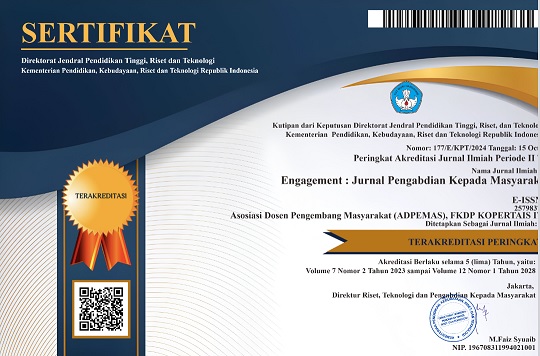Enhancing Digital Literacy for Ustadz/Ustadzah in Modern Islamic Boarding Schools at Banten Province through Sustainable Media Integration
Abstract
Mastery of digital literacy is one of skills that must be possessed by modern humans in order to compete in the 21st century. However, the use of digital literacy as learning media and information acquisition has not been utilized optimally, included in the three fostered modern Islamic boarding schools (hereinafter pesantren). Therefore, this community service activity has main objective, namely to provide training for ustadz/ustadzah council in designing digital literacy programs that can be integrated in the learning process sustainably. To achieve the objective, this program used Community Based Participatory Research method by involving various parties such as residents of pesantren (kiai, ustadz/ustadzah, librarian and santri), community representatives (literacy activists), and lecturers (universities). Finally, this program has positive implications. This is reflected in: (1) the integration of digital literacy media into the learning process sustainably; (2) the development of a literacy culture; (3) the realization of a literate pesantren environment.
Downloads
References
Ahmad, Ibnu., Irham Bayquni Ansori, and Siti Maryati. Interview by authors, July 2021.
Anwar, M. Zainal., Nur Kafid, and Khasan Ubaidillah. “Literasi Islam Santun dan Toleran: Pendampingan terhadap Kelompok Muslim Milenial untuk Mencegah Arus Radikalisme-Ekstrim di Soloraya.” Engagement: Jurnal Pengabdian kepada Masyarakat, Vol. 05 No. 01 (2021): 233-249, https://doi.org/10.29062/engagement.v5i1.319
Azra, Azyumardi. Jaringan Ulama Timur Tengah dan Kepulauan Nusantara Abad XVII & XVIII: Akar Pembaruan Islam Indonesia. 3th ed. Depok: Prenadamedia Group, 2018.
Bruinessen, Martin Van. Kitab Kuning, Pesantren dan Tarekat: Tradisi-Tradisi Islam di Indonesia. Bandung: Mizan, 1999.
Coughlin, Smith and Fernandez. Handbook of Community-Based Participatory Research. Oxford: Oxford University Press, 2017.
Depag RI, Pola Pembelajaran di Pesantren. Jakarta: Direktorat Jenderal Kelembagaan Agama Islam, 2003.
Evemenova, Anya S., Kelley Regan, Amy Hutchinson. “AT for Writing: Technology-Based Graphic Organizers with Embedded Support.” Sage Journal, Vol. 52 Issue 4, (February 2020): 268. https://doi.org/10.1177/0040059920907571.
Glister, Paul. Digital Literacy. New York: Wiley, 1997.
Iskandar, Hasyim. “Dakwah Komunitas Arus Informasi Santri (AIS) Banyuwangi melalui Literasi Digital.” Thesis., UIN Sunan Ampel, Surabaya, 2018.
Jafar, Ali. “Literasi Digital Pesantren: Perubahan dan Kontestasi.” Islamic Review: Jurnal Riset dan Kajian Keislaman, Vol. VII No.1 (2019): 17-35. https://doi.org/10.35878/islamicreview.v8i1.156
Jurrīëns, Edwin and Ross Tapsell, ed., Digital Indonesia: Connectivity and Divergence. Singapore: ISEAS Publishing, 2017.
Leavy, Patricia. Research Design: Quantitative, Qualitative, Mixed Methods, Arts-Based, and Community-Based Participatory Research Approach. New York: The Guilford Press, 2017.
Mukhlisin et al., “Urgensi Literasi Digital bagi Santri Milenial di Pondok Pesantren Rahmatutthoyibah Al Iflahah Gunung Kaler Tangerang.” Jurnal Pengabdian Kepada Masyarakat: Aphelion, Vol. 1 No.2 (February 2021): 208-214. https://doi.org/10.32493/jpka.v1i2.9672
OECD. PISA 2012 Results in Focus. Programme for International Student Assessment. (2014): 1-44. https://doi.org/10.1787/9789264208070-en
Tim Penyusun. Panduan Gerakan Literasi Nasional 2017. Jakarta: Kementerian Pendidikan dan Kebudayaan, 2017.
UNESCO. The Prague Declaration: Toward an Information Literate Society. 2003.
Zabidi, Mohammad Naufal and Abd Bassith Tamami, “Keefektifan Upaya Meningkatkan Literasi Digital pada Pesantren Rakyat di Al-Amin Sumber Pucung Malang.” Jurnal Pendidikan Indonesia, Vol. 2 No.1 (2021): 48-58, https://doi.org/10.36418/japendi.v2i1.44
Zulhimma, “Dinamika Pondok Pesantren di Indonesia.” Jurnal Darul Ilmi, Vol. 01 No. 02 (2013): 165-181. https://doi.org/10.24952/di.v1i02.242
Copyright (c) 2023 Engagement: Jurnal Pengabdian Kepada Masyarakat

This work is licensed under a Creative Commons Attribution-ShareAlike 4.0 International License.






.png)




